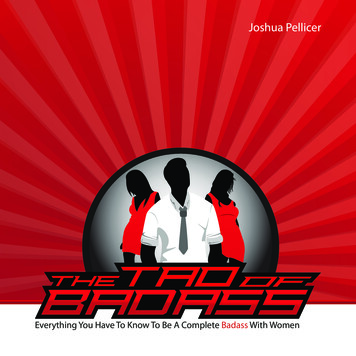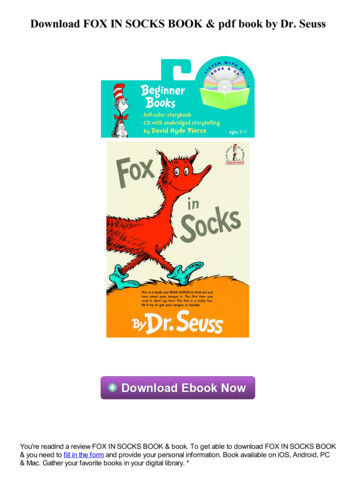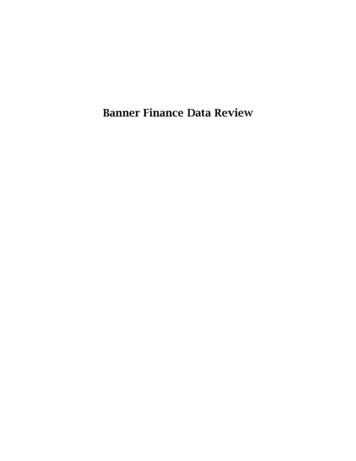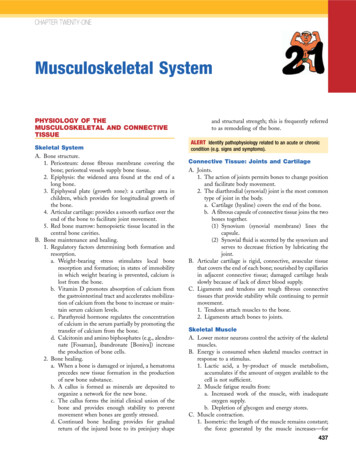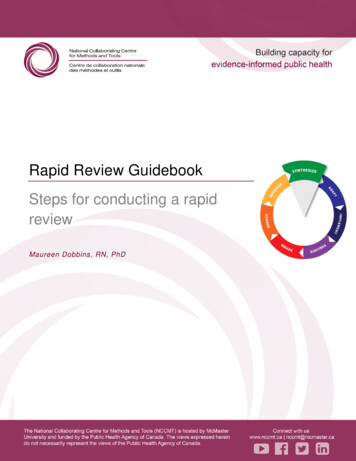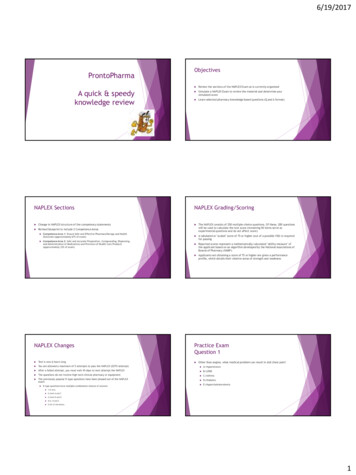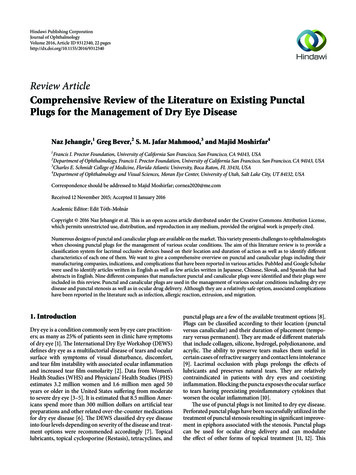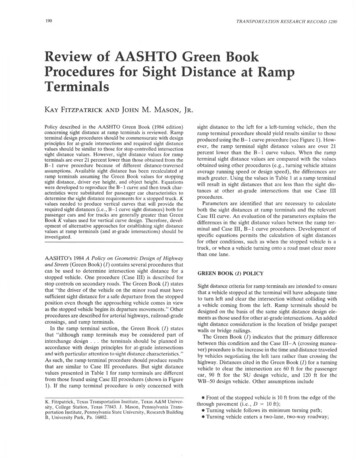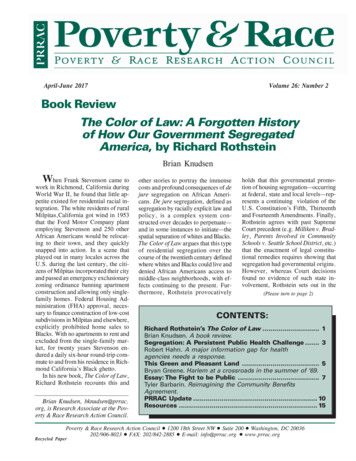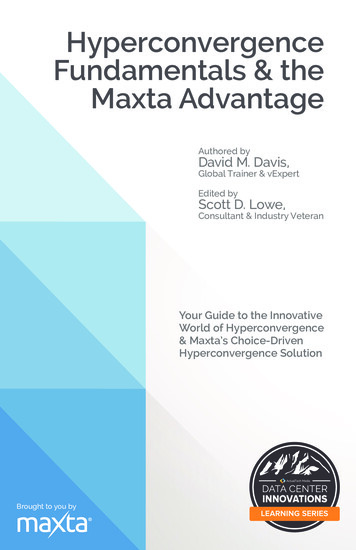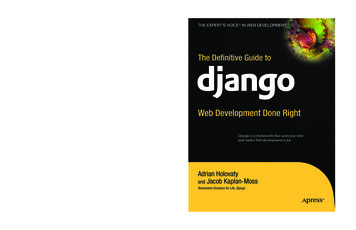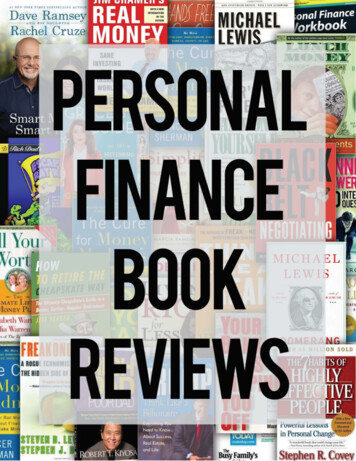
Transcription
Arn rn,1,·''""'"' llf iir El.ll"il'T 1nDave Ram eRachel Cruz\ll lllll\U(.JITlff
TABLE OF CONTENTSIntroductionRelationshipsWhen She Makes More.2One Bed, One Bank Account.3Emotional Currency.5Thin, Rich, And Happy.6Permission To Prosper .7The Cure For Money Madness.8Smart Couples Finish Rich .9Global EconomicsHormegeddon.10When The Money Runs Out .11After The Music Stopped .13House Of Debt .15Money, Greed, And God .17The Trillion Dollar Meltdown .18Easy Money, High Rollers, And The Great Credit Crash .18The Purpose Economy.19Money ManagementMoney: A Love Story .20The Index Card .21The 5 Lessons A Millionaire Taught Me About Life And Wealth.23The Moneyless Man .24The Behavior Gap .25Personal Finance For People Who Hate Personal Finance.26The Busy Family’s Guide To Money.27Living Rich For Less .28Personal Finance Workbook For Dummies.29
The Wall Street Journal Complete Personal Finance Guidebook.30All Your Worth.31Freakonomics .32The Prosperity Aerobics .33The Richest Man In Babylon.34Secrets Of The Millionaire Mind .35Overcoming Underearning .36Young Adults/EducationSmart Money Smart Kids .37Why Didn’t They Teach Me This In School? .38Rich Dad’s Escape From The Rat Race .39Whatever Happened To Penny Candy? .40Debt-Free U .41Make Your Child A Millionaire .42Get A Financial Life .43Dollars And Sense For Kids.44A Smart Girl’s Guide To Money.45Lunch Money.46The Money Book For The Young, Fabulous And Broke.47TaxesLower Your Taxes – Big Time!.48Taming The Paper Tiger At Home .49InvestingThe Seven Rules Of Wall Street .50The Money Masters .51The Wall Street Journal Guide To Understanding Money And Investing .52The Armchair Millionaire .53Nothing Down .54Jim Cramer’s Mad Money .55Blind Faith.57Retirement
How To Retire The Cheapskate Way .58Social Security For Dummies .59You’ve Earned It, Don’t Lose It .60The Automatic Millionaire .61How to Retire With Enough Money And How To Know What Enough Means .62Refire! Don’t Retire .64SaveBlack Belt Negotiating .66Be Thrifty .(Not Cheap!) .67House Of Havoc.68Fight For Your Money .69Ready To Wear .70Moneyball .71Your Bank Is Ripping You Off .71The Ten Roads To Riches .73Buyology – Truth And Lies About Why We Buy .74DebtDebt Free .75Financial Peace Planner .76Credit Repair.77Solve Your Money Troubles .78The Nine Steps To Financial Freedom .79Debt-Proof Your Marriage .80Life After Debt.81LifestyleThe Seven Habits Of Highly Effective People .82Winning Answers To 500 Interview Questions .83The Complete Idiot’s Guide To Working Less, Earning More.84Essentialism .85The Achievement Habit .87Triggers .89
A Curious Mind.91The Life-Changing Magic Of Tidying Up .93Lost and Found.95Think Like a Freak .96Simplify Your Holiday Season .98Give And Take.99Who Owns The Future .100Lean In.102Peaks And Valleys .103The Difference.104I Shop, Therefore I Am .105Organizing From The Inside Out .106Rich Dad, Poor Dad .107
IntroductionBooks! Love em or hate em, there’s something about the knowledge gainedfrom a book, at your own pace, on your own time, without staring at a computerscreen and getting a too-much-screen-time headache. There’s a lot you canlearn by picking the right books, but other than judging each book by its cover,how can you possibly know which books are worth your time?That’s why we’ve compiled this book. Listing our favorite 90 books on personalfinance and related topics, we think you’ll agree that skimming our take on thesebooks will help you decide which ones you want to read.Have you read other books not mentioned here? Let us know--we’d love to hearfrom you!So curl up at the fireplace on a cold winter night or on the beach on a warmsummer afternoon, and pick your favorite books. Then find them at the library,online or in your local book store.Happy reading!--All of us at the credit union.Page 1
RelationshipsWhen She Makes MoreAuthor: Farnoosh TorabiTopics: Women Earning More, Women In The Workforce, Women's IncomeWith the glass ceiling all but gone,today’s working women face achallenge that may be a feministdream, but it’s a challengenonetheless: They’re earning morethan their partners. In fact, womenunder 30 have a higher median incomethan men in most major US cities.While this may sound wonderful onpaper, anyone who has been in thesituation (due to unemployment or amore permanent imbalance in salary)knows how the dynamics of arelationship can shift when she’sbringing in more than him. Does hefeel unneeded? Does she feel she’d bebetter off without him? Does he take onmore of the traditionally female responsibilities like housekeeping andchildcare? Does she resent it if he doesn’t? Most importantly, what can both menand women do to make this new reality work for them, without losing out ineither the workplace or the relationship?Bravely stating the facts, the risks, and the often not politically correctrepercussions, Torabi offers practical advice and guidance for having it all (ahappy marriage and a successful career) to women who are doing it all.Page 2
One Bed, One Bank AccountAuthors: Derek Olsen, Carrie OlsenTopics: Couples And Money, Talking About Money, Marriage, BudgetingMost personal finance books are writtenfor an individual audience and featureguidance for one person makingautonomous decisions to maximizepersonal wealth. There’s nothing wrongwith that, but for many people, it’s nottheir financial reality. In the real world,you might live and share a life withanother person.The financial aspects of marriage areamong the most hotly debated, butwithin a marriage, most partners don’tactually talk about their finances. Thosewho do, don’t talk very well. Poll after pollhas shown that the number one cause offights and divorces is money problems.Since we’re trained from a young age thattalking about money is rude, when we suddenly find ourselves in situationswhere we have to do so, it’s no surprise many of us can’t do it very well.That’s where One Bed, One Bank Account comes in. Co-authors Carrie andDerek Olson host a relationship podcast called “The Better Conversation,” andthey’ve taken their personal, relatable style from podcast to book. They relatethe story of their major financial calamity as a couple, and offer suggestions fortalking about financial problems in a marriage more generally.The book is well-written and engaging, relying on anecdotes and humor to easeinto what is, for many people, a very uncomfortable subject. The tone isempathetic, as the Olsons seem to understand the delicate positions of theiraudience. Practical wisdom is blended with touching stories of romance to makeit a book every couple will enjoy reading.It may seem like the only way to avoid having fights about money is to get moremoney. The truth, as the Olsons lay out in the book’s introduction, is that withoutPage 3
strong, transparent communication, money fights are inevitable. Money fightsdon’t come from a lack of money; they come from a lack of communication.Financial hardships happen. Job losses, medical bills and car repairs are randomevents that could happen tomorrow, next week, next month or next year. Theycan’t be easily prevented, but you can change how you react to them. One Bed,One Bank Account will equip you and your partner with the skills to survive andthrive through any financial challenge. The rewards, both financial andrelational, will last a lifetime.Page 4
Emotional CurrencyAuthor: Kate Levinson, PhDTopics : Book, Emotional-health, Financial Difficulties, Quality Of LifeWhat is it about money that brings outthe best (and worst) in us? Why doesmoney bring up so many emotions?Written by a psychologist who’s seen itall, Emotional Currency is different frommany other financial books because ithelps readers explore the emotionsthat are so intertwined with personalfinance. Filled with stories andquestions you can ask yourself, this is amust-read for anyone who hasstruggled with the emotional side ofmoney: making it, saving it, spending itand investing it.Page 5
Thin, Rich, And HappyAuthor: Wayne E. NanceTopics : Emotional-health, Problem And Solution, Quality Of LifeArguing that financial, health andrelationship issues are all caused by thesame underlying problems, Nancedetails how changing the root causesof these three problems will result inlong-term success.Writing off diets, date nights, andbudgets as quick fixes, this bookfocuses on permanent solutions. Whilesome of it sounds a little too simplistic(a three-minute personality test?!) andthere’s a lot of analogy which doesbecome tiresome (are you a sailboat ora barge?), there’s a wealth of goodinformation here, if you’re looking forchange that will last in more than onearea of your life.Page 6
Permission To ProsperAuthor: Azriela JaffeTopics : Couples And Money, Gender Roles, Goal-Setting, MarriageDoes a woman need her husband’s permission to prosper financially?The question alone may provoke strong emotions, as it did when Jaffe firstdiscussed the idea in her Fortune Small Business online column. However, thefact is that at the time the book was written (the numbers are higher today) over30% of working women earned more than their husbands. Is that a problem formen? For women? How is the marriage affected? How is her career (and his)affected when she doesn’t get his buy-in to her career goals? Is it possible for awoman to have a happy marriage and a successful career at the same time?These are some of the questions Jaffeaddresses in her groundbreakingbook. Not only are all these questionsanswered and analyzed with extensiveresearch, but Jaffe advises women onhow to get that buy-in from theirhusbands with warmth and good will.Permission to Prosper counsels womento take responsibility, analyze whetherthe marriage is a good one, and if it is,seek interdependence as a higher goalthan independence. Jaffe coverssituations such as when a man is laid offor disabled or a woman wanting to be“taken care of” but remainindependent at the same time.Permission to Prosper is a must-read for any woman who, by choice or bycircumstance, finds herself in a marriage where she is the primary breadwinner.Page 7
The Cure For Money MadnessAuthor: Spencer ShermanTopics : Emotional-health, Investing, Net Worth Vs. Self Worth, Problem AndSolutionOn the assumption that a “money monster” dwells within many people, SpencerSherman, named a top wealth advisor by Worth Magazine, discusses howpeople can rid themselves of what he calls money madness. Mistakenassumptions, such as two can live as cheaply as one, “I know we’re rich becausewe drive a BMW” and equating self-worth with net worth are holding peopleback, the book asserts, from maximizing their wealth and happiness.It’s a sweeping claim, but if you feelthat something internal, an idea, or away of looking at things is holding youback financially, you may want to pickup this book. The Cure for MoneyMadness lists the top 10 “moneymadness” behaviors, including notbeing able to talk about money evenwith the people you’re closest with,wanting to earn a fortune quickly,measuring yourself on the basis ofmoney alone and hating money andthose who have it.Scattered exercises throughout thebook will help with self-discovery ifyou’re wondering if money madnesshas been a problem all along, and theRainbow Portfolio, the author’s own investment strategy (simple and boring, buthe claims it works) may be the most valuable part of this book.Page 8
Smart Couples Finish RichAuthor: David BachTopics : Couples And Money, Financial Goals, Financial Planning, FinancialSecurityMention a book on finances and the reaction you’ll get from the average personis rolled eyes or a yawn. Most financial books are difficult to read and, ingeneral, not very interesting.David Bach’s Smart Couples Finish Rich is a wonderful exception. By showingpeople how to examine their values and set financial goals accordingly, Bachaddresses the big picture. He helps you to acknowledge that money alone doesnot lead to happiness.Most couples, Bach notes, disagreeover money more than anything else. Inexplaining how to plan your financeswith your spouse, this book helpscouples work together to ensurefinancial security. It’s worthwhilereading whether you’ve never eventhought about investing or alreadyhave an impressive portfolio.In Smart Couples Finish Rich, Bach hastaken a topic that usually intimidatespeople and made it enjoyable,empowering and easy to read.You can get this and Bach’s other booksat your local library, book store, or thewebsite www.finishrich.comPage 9
Global EconomicsHormegeddonAuthor: Bill BonnerTopics : Economy, Economic PoliciesWhat happens when you get too much of agood thing? Hormegeddon, of course. Stillconfused? Hormegeddon is a term coined bybillionaire entrepreneur and New York Timesbestselling author Bill Bonner. It is acombination of the bio-chemical hormesis, aprocess in which small doses of certainsubstances are beneficial to an organism whilelarge doses prove lethal, and Armageddon. Itis also the title of his book.Hormegeddon, according to Bonner, is theinevitable result of too much centralization ineconomic and policy matters. It’s what happenswhen small-scale solutions are applied on too grand a scale, and history andlogic doom them to failure, but the very people who should realize this are theones implementing them. Bonner argues that, while often a little centralplanning and public policy interference can be a good thing, too much of it canlead to disaster. Public economic policy in a small town can be known andmeasured while huge country-wide central planning initiatives are often blindlyplunged into since so much is impossible to measure. Yet, the money keepspouring into investments whose rate of return has long since fallen below zeroand entire economies are dragged along for the ride.Despite its gloomy predictions, Hormegeddon makes for a surprisinglyentertaining read. It is peppered with fascinating historical tidbits and Bonner’strademark sharp humor. While one can disagree with Bonner’s conclusions, hiswriting is both entertaining and engaging. If nothing else, Bonner leaves hisreaders duly warned about Hormegeddon.Page 10
When The Money Runs OutAuthor: Stephen D. KingTopics : Economy, Money, HSBCA horror book written by Stephen Kingdoes not strike as anything out of theordinary, until one takes a closer lookand realizes that this is Stephen D. King,chief economist at HSBC, and not hisfiction-writing fellow author. And yet,Stephen D. King has written a horrorstory that could rival its fictionalcounterparts because the facts it detailsare so chillingly true.Taking a clear-eyed look at the future,King examines his uncomfortable beliefthat both sides of the raging austerity vs.stimulus debate in dealing with the GreatRecession are wrong. He argues thattheir assumption that the recession wasjust a blip on the screen of economicgrowth and prosperity is false. In King’s opinion, we can expect growth rates toremain stagnant indefinitely, a terrifying proposition indeed.When the Money Runs Out is deep in economic history, in which King argues thefactors causing the rapid growth after the end of World War II are no longerpresent. Demographic changes, globalization that has turned initial tradesurpluses into deficits and many other factors have stopped the rapid economicgrowth that wealthy, developed nations enjoyed in the second half of the 20thcentury. It is that rapid growth that was the exception, not the current slowdown.For King, Japan’s economic struggles are not an anomaly, but a prophecy thatthe West should heed.And so King turns to what happens When the Money Runs Out and the citizensof affluent nations are used to increasing standards of living and entitlementswhile their governments are drowning in seas of debt and turning to stimulusactions in hopeful desperation. The picture that emerges from this mix of politicsPage 11
and economics is not pretty, and King’s book teeters on the verge between thehorror and dystopian genres.Still, King is not a writer of horror fiction, nor is he a fearmonger. He is arespected economist sounding a Cassandra-like warning in clear,understandable prose. And he proposes solutions to avoid the disaster that heforesees. While they’re not easy, they are certainly easier than the future hepredicts if they are not heeded.Page 12
After The Music StoppedAuthor: Alan S. BlinderTopics : Economy, Financial Crisis, Public PolicyAfter the Music Stopped, by Alan S.Blinder. sets itself the formidable task ofobjectively explaining the worst financialcrisis in America since the GreatDepression. As the book title suggests,it’s a comprehensive report, from why ithappened, to what the government’sresponse was and what should be doneto complete the recovery and set futurepublic policy.Thankfully, Blinder is an economist whowrites well. His credentials as a Princetonprofessor of economics, Wall StreetJournal columnist, former vice chairmanof the Federal Reserve Board and one ofthe members of President Clinton’sCouncil of Economic Advisers set him up perfectly for the economic facts of thebook. His gift as a storyteller makes it incredibly readable.Blinder starts with the infamous housing and bond bubbles, and finally the stockmarket collapse. He details how these events spiraled out of control across theinterconnected global economy. He discusses the responses of both the Bushand Obama administrations. Instead of focusing on the petty details of the what,he zeroes in on the whys.Blinder posits that the financial crisis did not happen in a vacuum. He arguesthat, years prior to the crisis, the US financial system had grown increasinglycomplex and unstable. It had far too little or incompetent government regulationand was a too-tall “house of cards” built with reckless errors and unethicalchoices. When hit by a veritable tornado of crises, the house of cardscollapsed. Instead of blaming the usual culprits, like the housing bubble, Blinderfocuses on a total picture. If there is one event that he considers “the watershedevent,” it is the collapse of Lehman Brothers on Sept. 15, 2008 followed by thegovernment’s decision not to bail it out. While giving our currentPage 13
macroeconomic performance a big F, Blinder feels that the government’sresponse over the years has been effective.Blinder also offers his own solutions for the future, notably his Ten FinancialCommandments that contain gems like, “Thou Shalt Remember That PeopleForget” and “Thou Shalt Not Rely on Self-Regulation.” Eminently readable, thisbook is the comprehensive read for “the rest of us,” who are not economists butwould like to understand what it was all about.Page 14
House Of DebtAuthors: Atif Mian And Amir SufiTopics : Debt, Managing Debt, Paying Off Debt, Great RecessionAmerica is still picking up the piecesfrom the financial collapse of 2008.People are still jobless, homeless andfinancially insecure. As we try to put oureconomy back together, it’s helpful totake a look at why and how things fellapart.That’s the goal of House of Debt by Dr.Atif Mian. Mian, a professor ofeconomics and public affairs atPrinceton, argues that the recessionwas both a personal and a politicalfailure. In order to prevent anotherfinancial crisis, we need to correct botharenas.Mian examines a massive array ofeconomic data from the years leading up to the Great Recession, as well as theperiod before the Great Depression and the European economy before itseconomic malaise. He concludes that the common thread that unites theseeconomic disasters is the tremendous rise in household debt.The facts are clear: Between 2000 and 2007, household debt increased by 7trillion. The economic boom was financed by a tremendous increase inconsumer debt. When individual households were up to their eyeballs andcould borrow no more, the bubble burst. Mian lays it out cleanly: The reason forthe financial collapse was too much borrowing.The strongest part of the book is the clarity of the causal reasoning. Mian hascommand of an amazing array of evidence and supports his central argumentwell. He presents a strong, compelling story of the events leading up to themeltdown of 2008.Page 15
The second part of the book details Mian’s solutions to the problem. Thepersonal finance solutions are the weakest part of the book, and it’s not becausethe solutions aren’t correct. There’s just nothing new or novel about Mian’s waysto get out of debt. All that’s new here is the motivation: Getting out of debt ismore than a good idea. It’s a civic responsibility.Mian’s policy solutions are far more interesting. He discusses new ways toregulate financial institutions. He makes a strong case for a greater governmentintervention regarding personal finance in order to stave off another ruinousboom-bust cycle.House of Debt is a good read for people interested in the policy side ofpersonal finance. It’s clear, readable, and well-researched. Mian is an expert inthe field, and his expertise makes this book a strong entry into the publicdiscussion on financial reform.Page 16
Money, Greed, And GodAuthor: Jay W. RichardsTopics : Capitalism, Christian, Consumer, Greed, Religion“Can a Christian be a capitalist?” This politically and religiously loaded questionserves as the opening and the premise of Money, Greed and God, Jay W.Richards’ book exploring the
Rich Dad, Poor Dad . 107 . Introduction . Books! Love em or hate em, there’s something about the knowledge gained from a book, at your own pace, on your own time, without staring at a computer . The book is well-written and engaging, relying on anecdotes and humor to ease into what i
